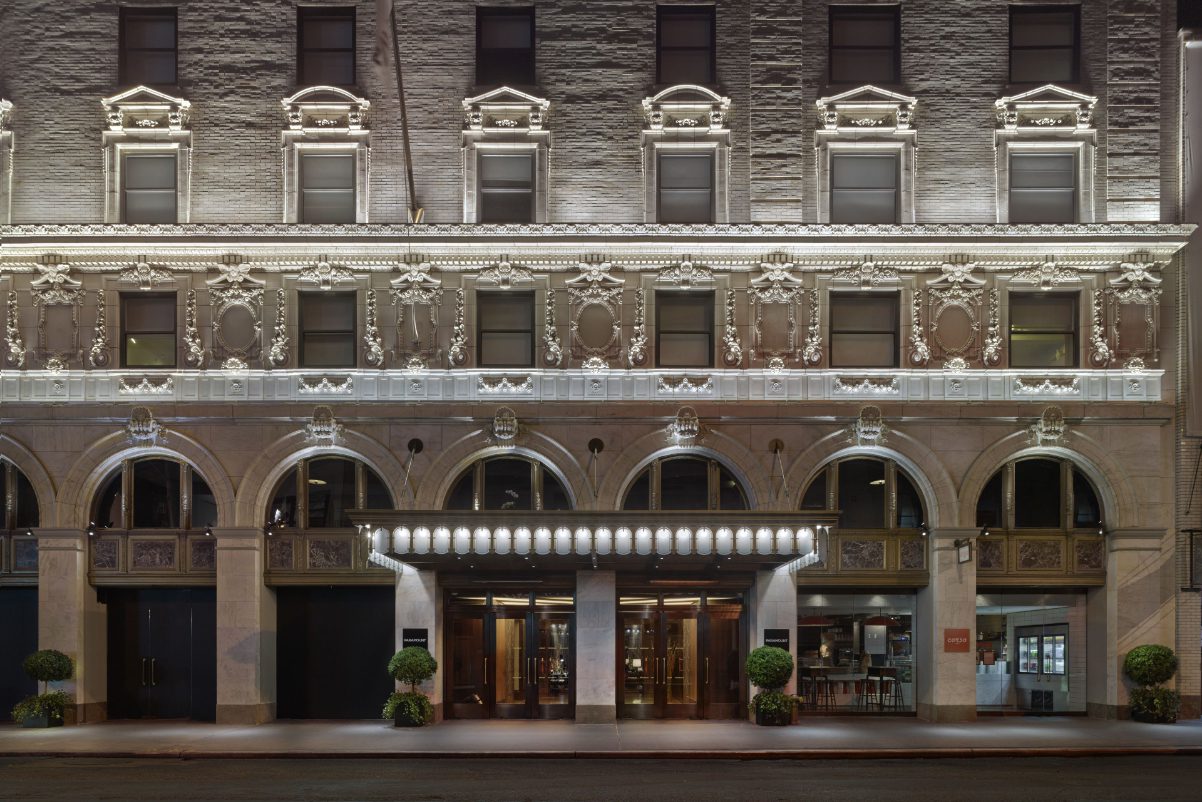Skift Take
Generator makes an intriguing case that there's an opportunity to target well-off millennial travelers looking for distinctive places to stay in cities where budget hotels with buzzy bars are scarce.
Generator said on Tuesday it had gained management control of the Paramount — a hotel with 605 guest rooms in New York’s Times Square — in a strategy adjustment for the UK hospitality company, which runs hostels and other premium economy lodging.
Generator, acquired in 2017 by private equity firm Queensgate Investments, had never managed a hotel as a third party. The company, whose chains are Generator and Freehand, has instead had an ownership interest in its properties.
“We’re finally ready for third-party management,” said CEO Alastair Thomann during an interview while visiting Washington, D.C. “We have more deals to announce shortly. Next year we’ll start doing franchise deals and possibly licensing deals.”
The group is on track to produce between $200-$250 million in revenue next year, Thomann said.
Premium Economy Lodging
The deal underscores how hostels, smaller-roomed hotels, and other “premium economy” lodging have attracted a lot of investor capital.
Selina, a youth-focused hospitality brand, teased last week that it still plans to go public this year in a merger with BOA Acquisition Corp — a special purpose acquisition company (SPAC) — in a deal that may turn out to be valued at more than $1 billion. In June, Singaporean fund GIC and Dutch pension manager APG said took a majority stake in The Student Hotel, which offers mixed-purpose budget lodging. Draper Startup House, a collection of hostels for professionals, received fresh investment this year.
In 2019, Queensgate bought Freehand, a premium hostel chain, for $400 million, and merged its back-end operations with Generator. In 2014, Marriott opened its Moxy brand with a lifestyle vibe and rooms at 185 square feet, while The Standard has been expanding its Bunkhouse brand.
The Key Is “Compression Markets”
Hostels have been around forever. Generator stands apart by only running hostels in places where demand for affordable travel lodging outstrips supply. Central locations like Times Square are critical to the formula.
“Compression markets deliver exceptionally high returns,” Thomann said. “We love a market like Miami, especially during major events like Art Basel. But we’re not looking to open in a city like Bangkok, where there’s already a lot of supply.”
In July, Generator’s shared accommodation properties reported revenue 37 percent above its best-ever numbers, Thomann said. It generated adjusted earnings before interest, taxation, depreciation, and amortization — a measure of profit — that was 60 percent above its July 2019 figure. The private company didn’t reveal more specific numbers.
“The RevPars [revenue per available room] we achieve are like those at four-star hotels, though we operate the properties at one- to two-star costs,” Thomann said.
But aren’t short-term rentals, with their quirky lodging and elastic supply, a competitive threat to the model?
Thomann said a segment of the youth market is seeking lodging that offers social connections with other young international travelers. Generator and Freehand try to provide these spaces in ways that resonate more with them than what’s available at a short-term rental or the typical city hotel. It hires specialists in food and beverage to create buzzy restaurants, bars, and cafes.
“We’re one of the few hospitality brands where our food-and-beverage outlets get about 90 percent of their revenue from non-guests,” Thomann said. “At Broken Shaker at Freehand Miami, cocktail revenue can be triple the room revenue, and it comes at a higher margin.”
Airbnb is a major driver of Generator’s bookings via its hotel offerings. So is the online travel agency HostelWorld, which stands apart from, say, Expedia, by offering the ability to book individual beds in shared accommodation.
Family Travel a Growing Segment
Parents with young children have been a growth segment, Thomann said. They tend to keep different schedules than twentysomething guests and can use the property’s game areas and restaurants differently and on different time shifts. Generator and Freehand also provide private rooms with bunk beds at rates that are often cheaper on a per-person basis than traditional hotels in many cities.
“With our standard private rooms with extra beds, we compete with the three-star hotels in these destinations in the sense that guests perceive they’re getting value,” Thomann said.
To be sure, Generator most truly competes with three-star hotels when there’s a major event that further creates a supply mismatch in a market, such as Art Basel in Miami, the Paris Auto Show, or a championship sport event in Madrid. But those high-margin days can be pure profit in an otherwise stable and strong year.
Generator’s takeover of the Paramount, owned by Aby Rosen’s RFR, will coincide with “an extensive refurbishment” of guestrooms and public spaces. RFR has other hotel interests, mostly higher-end properties. In April, it bought the 241-key Yve Hotel Miami for $26 million.
Keeping Costs Down
If Generator follows its typical playbook, a lot of extra space in the Paramount will be streamlined. Across its 15 other properties, it has only about 1,000 employees — a relatively slim staff on a per-bed count. Tasks such as revenue management, marketing, and IT are centralized at the head office. Software, such as property management system Mews and revenue management system Duetto help streamline operational staffing, Thomann said.
“A few years ago, software providers weren’t able to solve the problems of shared accommodation, but now more providers, such as Cloudbeds and Pace Revenue, are building functionality,” Thomann said. “People are waking up to the opportunity in shared accommodation.”
The takeover of Paramount underscores how Generator will step toward becoming a more asset-light company.
“After the pandemic detour, we’re finally ready to scale up our brands,” Thomann said.
Have a confidential tip for Skift? Get in touch
Tags: future of lodging, generator, generator hostels, hotel development, new york city, renovations, times square
Photo credit: The Paramount Hotel in New York City is now under third-party management by Generator. Source: Generator.
